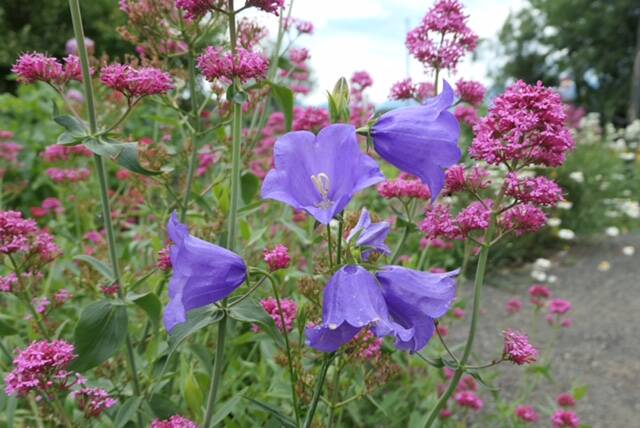August is usually the warmest month on the Olympic Peninsula: it’s most certainly going to be dry, so be sure to monitor your garden and keep plants well watered. If you have a watering system, it’s important to do a visual inspection several times a week to confirm it’s working as required.
This is also the time of year to turn and moisten the compost pile. Keep building your compost by layering green and brown organic materials. The air from turning and moistening the material will really get it cooking.
Flowers
Many flowering plants are at their prime. Bringing cut flowers indoors to enjoy is a great way to beat the seemingly endless need to deadhead. Deadheading, or removing spent blooms, will keep flowers blooming longer.
Roses
Black spot on roses can be a real challenge. Remove leaves with black spot and regularly clean up any debris around the plant. While deadheading roses, also prune lightly for a pleasing shape: remove crossing branches and work to open up the center of the plant for good air circulation. Do not compost any diseased plant material.
Bulbs (corms, rhizomes, etc.)
August is a good time to think about spring in the bulb garden. Get ready for fall planting by looking at catalogs to select your spring bulbs. Dig and divide irises and remember to plant them so that the top of the rhizome is visible.
Trees, shrubs
Avoid extensive pruning of trees and shrubs since it encourages new growth late in the season; remove dead material and shape lightly if needed. Remember, even drought-tolerant plants do better with occasional deep watering during the extremely dry Pacific Northwest summers.
As an exception, it’s important to prune most mophead Hydrangeas (H. macrophylla) as soon as the flowers begin to fade. Also, shear lavender to reshape it after blooming. This will prevent it from getting too woody.
Fruit trees, small fruits
Plums may be ripe and ready to harvest this month. It is most likely too early to harvest pears and apples. Apples are ripe and ready for harvest when the seeds turn brown. Pears need to be harvested when they reach mature size and while they are still hard, probably in September. Blueberries are ripe two to three days after the entire berry (including the end next to the stem) turns blue.
Veggies
Harvest, harvest, harvest. It’s also important to keep the vegetable garden clean and pest and disease free. If squash and cucumber plants show powdery mildew, cut off the affected areas. Watch for blight on tomatoes, prune off any diseased or damaged growth, and remove it from the garden area. Remove the entire plant if necessary.
If you haven’t already harvested your garlic, stop watering and lift it when four or five leaves are still green. Brush off the dirt and let them dry for a few days before storing.
There is still plenty of opportunity to plant kale, spinach, cabbage, lettuce, and more for a winter garden. Transplant broccoli, cauliflower, leeks, Brussels sprouts and Chinese cabbage starts, covering them with row cover to prevent insect infestations. Look for vegetable starts in your local garden center if you didn’t start your own in July.
Susan Kalmar is a Clallam County Master Gardener.
Prepare for fall
Late summer is a good time to start thinking about changes and additions you want to make in your garden. Fall is the best time of year to plant on the Olympic Peninsula: it’s dry enough to work in the garden and the coming winter rains will help nourish the plants. Late August may be a good time to purchase perennials, shrubs and trees for fall planting. In the heat of the summer you can get some good buys, but don’t plant them until the cooler days of late fall. Leave them in pots and water regularly.
Educational programs in August
Clallam County Master Gardeners have several interesting educational programs lined up in August. Two Green Thumb Presentations will be offered at the Port Angeles Carver Room (or by Zoom); both start at noon.
On Thursday, Aug. 10, learn “All About Cool Greens” from Bob Cain, a Master Gardener and vegetable area leader at the Woodcock garden.
On Thursday, Aug. 24 is “Growing Dahlias Successfully,” with Gary McLaughlin, a Master Gardener and dahlia area leader at the Woodcock Demonstration Garden.
Digging Deeper Presentations are workshops held from 10:30 a.m.-noon at the Woodcock Demonstration Garden, 2711 Woodcock Garden. On Saturday, Aug. 19, Master Gardener and all-around berry guru Jeanette Stehr-Green will present “Fall Berry Chores.”
For more detailed information, visit clallammgf.org.



